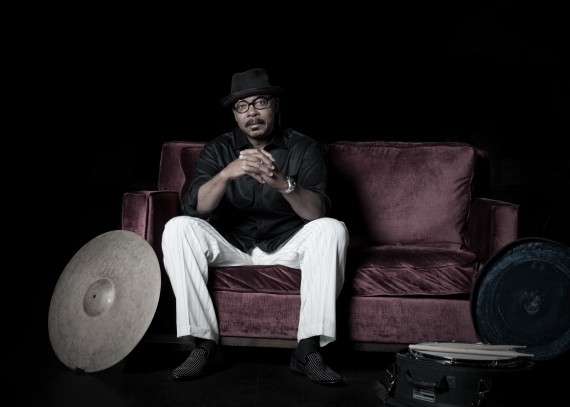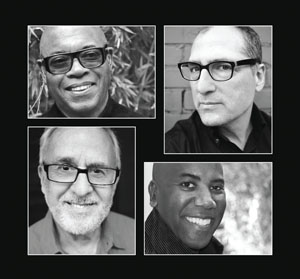Chameleon & Future’s Past: Chatting with Harvey Mason
by Veritas on May.05, 2014, under Press &Reviews
A Conversation with Harvey Mason
Mike Ragogna: Hey, is this The Chameleon?
Harvey Mason: [laughs] This is the Chameleon! Hey Mike, how are you doing, buddy?
MR: I’m pretty good, how’ve you been?
HM: Pretty great! Just fantastic.
MR: Yeah, I know, it looks like it. You’ve got a new album, Fourplay’s been doing great, and everything’s on the up and up with you right now.
HM: Yeah, I can’t complain, everything’s been great, I’ve just been having a great time, loving life and loving music and I’m going to continue to grow.
MR: Speaking of that, what do you think of the new album? What’s your impression of this Chameleon?
HM: I always travel to Japan with different projects, and I put a project together a couple years ago searching for something fresh. Every time I go I try to come up with something a bit different because they’re so flexible over there and they love so many different types of music. So I came up with this Chameleon project and brought it over to Japan and it was a hit. They loved it. So I said, “I should record this!” but I wanted to update the original, because when I went there before I played the music that was from that CD that I had never performed, since I never went on the road with it. That was the hook there in Japan, I had never been heard playing that music. So I had such a ball that I wanted to record some music that was reminiscent of that era but a little more forward-thinking. Once we got with the project with Chris Dunn at Concord, he really loved the concept and he started talking more and more about it. We ended up moving towards more of a retro record, that would feel twentieth century but we took some of that era’s most special classics that I played on and redid them. I think it’s a very interesting record. I wasn’t quite sure how it was going to be received, I thought for a while that it was re-hashing something old, but what makes it unique is the fact that we called in all these young, young players, twenty one, twenty two, guys that are up and coming giants, some of the youngest, brightest talents in jazz today, we called them to play, and it was surprising that they were familiar with the music. Initially they were mimicking it and I had to have them just be themselves and play the music. I think it’s a pretty interesting CD and I’m looking forward to seeing how people respond to it.
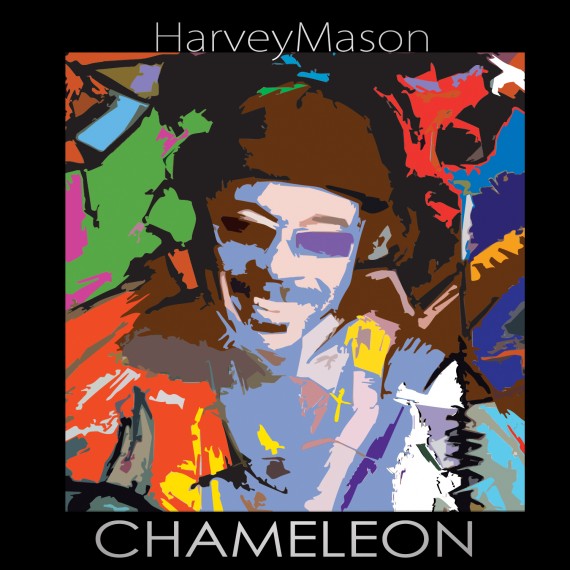
MR: How did you know these were going to be the right players for the interpretations you needed?
HM: I knew Ben, I worked with him on a George Benson project. The other guys, I must say, I heard Christian Scott before, I loved the way he played, Kris Bowers I’d never heard of, Matt Stevens I’d never heard, those people and Corey King were brought to me by Chris Dunn who is A&R director at Concord and he assured me that these guys could play and he’d send me CDs that they’d played on and once I heard it I said, “Absolutely.” Kamasi [Washington] had come highly recommended years ago and he’d played with me before. Mark de Clive-Lowe came through Chris Dunn as well. Pretty much Chris Dunn recommended a lot of these players, including Chris Turner and Corey King. A lot of them are on the Concord label as well, or will be, so it was very easy. Once I’d listened to their CDs and heard their playing I said, “Yep! Yep! He works, he works, he works.” And they’re all great guys as well! They’re all really cool people.
MR: What tunes were you surprised by when you revisited them for this project?
HM: “Montara.” When Chris suggested “Montara” I said, “Really?” It wasn’t something that people would know and recognize. Chris was a DJ one time and he really had his finger on the pulse of music during the seventies and eighties, and he said that was definitely a very, very popular tune and a lot of people would recognize it from that era. I’d never felt that way, but I trusted him because we were in sync. When we recorded it it turned out really nice and very, very interesting. I actually thought it was a boring tune initially, but everyone brought something to it and it turned out really very cool. I really like it.
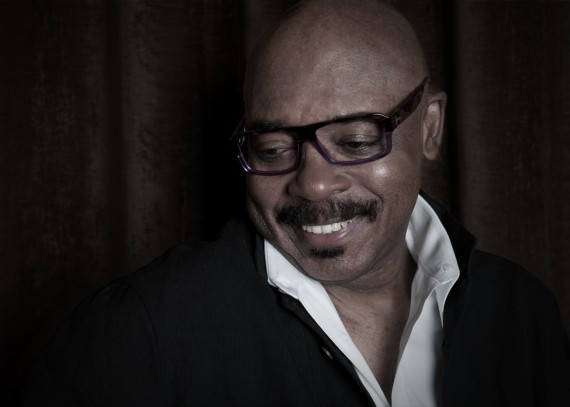
MR: What track do you think grew the most from the past to the present?
HM: “Chameleon” grew a lot. it’s hard to top the version that we did so I had to go in a different direction. We called in Ben Wendel from Kneebody to create a map for us to follow. He gave us a schematic, and there was a lot of meat there. That really morphed into something very, very special. Then I added Bill Summers, who’s one of the original Headhunters, to come up with one of his patented African chants, which we used as an intro and and outtro. I think that tune took a big leap and I think it’s really, really, really special.
MR: Did you feel like any of the artist had really grown by the end of the process?
HM: I didn’t look at it that way because I knew they’d given me what they had on the tunes. I really couldn’t tell if they’d grown, because I wouldn’t know. They were all so respectful and happy to be there and they gave everything they had and they were so easy to work with that it’s hard to know. But I’d say that every time you go to the studio and you’re playing with great musicians, you’re getting better and you’re growing. I’m sure they all get something out of the dates, but it’s hard for me to say and I can’t say that it’s apparent to me because I hadn’t spent that much time with them before or since.
MR: Were any of the guys big fans of you?
HM: Oh yeah, most of them. They really were. Guys would come in singing and humming different tunes that they’d heard and liked or listened to and would ask me questions about what was it like when I worked with Jaco [Pastorius] on that song or this and that and Mark de Clive-Lowe was playing songs saying, “We should be recording this song!” So yes, there was quite a bit of respect going around the room, and from my position as well because I respected all of these guys who were very young and very accomplished players with long lists of credits already at such a young age.
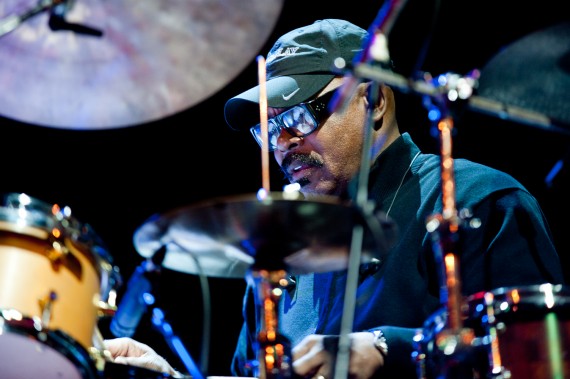
MR: Were there moments on this album where you just let the band go, as opposed to following the chart?
HM: Oh yes, we definitely walked into some areas where we’d just go, go, go, go, go. As a matter of fact there are some areas where we went that were cut, I’m sad to say, I guess because of time restraints and the overall feel of the CD. There’s some stuff that was not used that I thought was incredible. But there were a lot of moments where we just played and played and played and it was really special. I think people will hear those moments and really appreciate them, because I’m not sure you hear that much of that on CDs anymore these days.
MR: It seems like live music has more of the edge these days as opposed to going into the studio and recording “The Album.”
HM: Right. Well we all sat in a room together and played together, which really does not happen anymore. It was great. Everything you hear is what was played. Fourplay plays that way as well. We go in and record everything live. A lot of interplay with everyone, everyone’s listening, it was just a lovefest of musical magic.
MR: You collaborate with a lot of people who wouldn’t be considered part of your genre, like Santana, John Legend, and BB King. How do you look at music in general?
HM: I just love music. I love all kinds of music. That’s how I ended with the nickname “Chameleon” because I’ve played orchestral music, I’ve played drum music, jingle music, pop music, country music, latin music, I’ve played all kinds of music and I love it all. I feel that as long as I’m playing my instrument regardless of whether I’m growing as a musician–that’s my aim, to continue to grow and listen and learn and add new things to my repertoire. I love music and I’m happy to perform in any idiom, and I try my best to explore that idiom and try and expand it as well. So that’s how I look at it. I have no prejudice against any music. I just love the fact that I can sit down and play–I take great pride in the fact that I play on a lot of CDs of non-traditional jazz or whatever they are and that people have the confidence to know that I’ll come in and play whatever they need to the best of my ability. That’s what I’m really proud of. I have no axe to grind about it. Of course, I grew up playing jazz. Well, first I was in orchestras, but I loved jazz and played in top forty bands; I just didn’t discriminate. I just loved music. Of course I love creative music, just reacting and doing what I feel like playing. That’s my first love, I would say, but the thrill of playing any kind of music is still there.
MR: What do you think about the state of jazz these days?
HM: We can talk about the state of jazz, which I think it’s in great hands because what I’ve experienced from listening to all of these young players is that these guys are amazing and they’re steeped in tradition and they’re trying to expand the boundaries. I think from an artistic standpoint and a creative standpoint I think it’s moving forward and I think it’s in a great place. As far as the accceptance and the exposure I think it’s probably in trouble but I hope that it expands. It’s more accepted in Europe and Asia. They love it, jazz plays everywhere. I think there’s a place for it there and I hope the United States becomes more aware of our true art form of jazz. It originated here, so I hope that we begin to appreciate it as much as other countries appreciate it, because they certainly do over there.
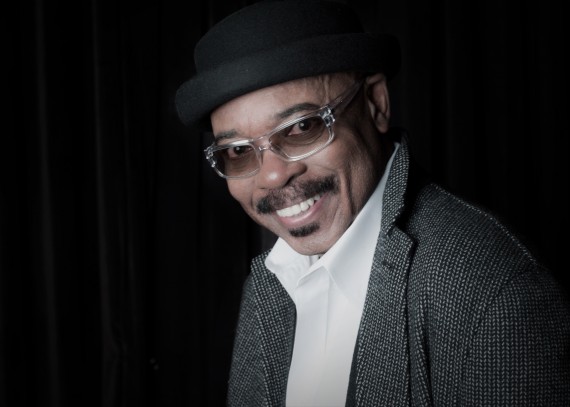
MR: It does seem like R&B and soul and funk elements often need to be combined in order for them to appreciate jazz.
HM: It seems that way, but I think when you go abroad and you hear the music in hotels and train stations and coffee shops, the just play jazz. You see businessmen after work going there alone, sitting in the chair, having a cup of coffee and listening to jazz. They put their heads back and just groove. That’s amazing to me. I love that. And the music fits, and there’s a DJ there playing all kinds of music right now, right today in Japan, all over Japan. That’s amazing to me. You know there’s something they’re getting out of the music. So I just hope that might happen here one day, but I don’t know, it seems like here there’s a definite agenda.
MR: My feeling is there’s an aggressive attempt to capture the dollar of certain demos, and they assume that those people will only like certain types of music and certain fads or styles and that’s all that they pump the money into for promotion, so that becomes the culture rather than different kinds of music that would seep in naturally.
HM: That’s exactly the truth. If you hear something, you have the chance to make up your mind and fall in love with it, but if you don’t hear it and it’s not there you don’t know. You can’t love what you don’t hear. So I think exposure is a big deal. I think if it were exposed there would be a larger audience and people would appreciate it more. At Concord, Chris Dunn is captain to a lot of very young people, Christian Scott and Kris Bowers and these guys, they have followings now, and there’s a club in LA called The Blue Whale and my release party is playing two nights there with all these young guys. The reason we’re going to be playing there is because that’s where there’s a young culture that’s heavily into the music. It’s not a large audience, but we’re tapping into that audience because we think they’re going to appreciate my CD. We’re trying to reach some of the young people there. I went there to see a couple of bands, and the enthusiasm and the seeming dedication from these young fans is great. That’s what we’re going to be.
MR: That’s beautiful, I really wish you luck with that, that’s incredible. What advice do you have for new artists?
HM: Just practice, listen to all kinds of music, and just play, play, play and go with your heart. Go with your heart and believe and anything’s possible. Believe in your heart and just play from the heart. Don’t try to emulate, try to create. I think creating and playing is where it’s at. Play from the heart. People can tell.
MR: What hasn’t Harvey Mason done yet?
HM: Hmm. I don’t know, there are some people that I’d like to play with, and I’d like to make some sort of quasi-classical record, a record infused with classical and jazz, I’d like to show that side of me and play some extensive works and write something, so that’s probably what I’d like to do, and continue to play with as many artists as possible. There’s a couple of singers I’d like to work with. I don’t want to name them because I don’t want to take anybody’s job, but there are a couple of bebop singers that I would really love to play with that record a lot. I just want to play with a lot of different people and continue to have new, fresh experiences. I’m always listening and trying to move forward. I just did a record for Quincy [Jones] with a new guitarist named Andreas Varady, who’s going to be ridiculous. I love those moments when you’re playing with guys who are recording in the major scene for the first time. I’m looking forward to that releasing, that was fun. Those are the experiences I look forward to, and I hope that’s a groundreaking record because this kid is sixteen and plays like he’s sixty. It’s not taught, he plays from the heart. Also nowadays the fact that jazz is in great hands and it’s still continuing, hopefully there will be ways that we can expose it to more people in the United States because it’s very strong everywhere else as I said.



